Projects & best practice examples
At the University of Greifswald several research projects are focusing on the sustainable use of degraded peatland sites. The projects aim for the replacement of destructive forms of land use on peat soils such as maize cultivation, grassland use and peat mining with peat conservation and sustainable cultivation of adapted plants under wet conditions.
Further projects investigate fundamental traits as hydrological, biological or geochemical charateristics of wet and drained peat soils.
Projects
Filter and sort list
Paludi4All
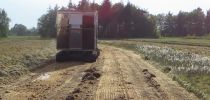
Socio-economic, climate and environmental aspects of paludiculture. More...
GreenMoor
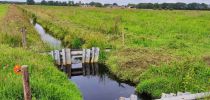
Sustainable dairy farming on raised bog soils. More...
Moor-PV
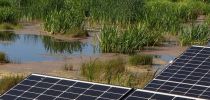
Climate and peatland protection by combination of photovoltaics and peatland rewetting. More...
PaludiAllianz
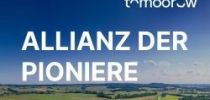
Development of scalable value chains with paludiculture biomass from rewetted peatlands in Germany in alliance with economic actors. More...
Paludicscout
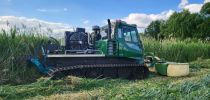
Development of an online information platform for specialized technology for harvesting machinery used on wet and rewetted peatlands. More...
WieMoDämm
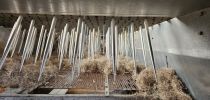
Production of insulation material from dominant paludiculture species from rewetted peatlands. More...
MOOSstart
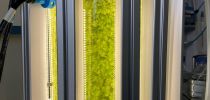
Small plant, big style - MOOSstart provides peat moss seeds on grande scale using a bioreactor.
More...
PaludiZentrale
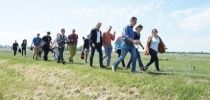
The project pools knowledge on peatland soil protection from four model and demonstration projects and ensures comparable and standardized data. More...
SoMoMed
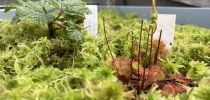
Sundew and cloudberry as medicinal plants in paludiculture. More...
ALFAwetlands
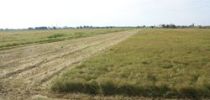
The project aims to improve the geospatial knowledge base on wetlands and assess such pathways to their restoration that involve a co-creation process. The project also provides information and indicators for sustainability to maximise climate change mitigation, biodiversity and other benefits. More...
Buffalo Farming
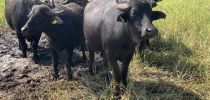
Integrating water buffalo into paludiculture value chains and plant-based bioeconomy.
More...
MoKKa - Moorklimaschutz durch Kapazitätsaufbau [DE]
![MoKKa - Moorklimaschutz durch Kapazitätsaufbau [DE] MoKKa - Moorklimaschutz durch Kapazitätsaufbau [DE]](/assets/images/a/Mokka_kohlgraben_210x110-53ps4qms4avffqn.png)
The MoKKa project is dedicated to stakeholder-based capacity building for peatland climate protection in Mecklenburg-Vorpommern and across Germany. More ...
Paludi-Product

Can peatland plants provide raw material for bioplastics? How could they be processed and what can they be used for? This is what the Paludi-Product project is investigating. More...
Paludi-PROGRESS
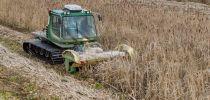
In the joint project Paludi-PROGRESS, the cultivation of cattails (Typha spp.) and reeds (Phragmites australis) as new permanent crops on wet peatlands is being tested and further developed. More...
Paludi MV [DE]
![Paludi MV [DE] Paludi MV [DE]](/assets/images/r/paludi_mv_001_210x110px-2awkw3ra04p1q2p.jpg)
Demonstrating exemplary solutions for the reduction of greenhouse gas (GHG) emissions and for peat conservation in cultivated peat soils. More ...
Paludi-Tiny House [DE]
![Paludi-Tiny House [DE] Paludi-Tiny House [DE]](/assets/images/w/Paludi-TinyHouse_NKoerner_210x110px-zrsw9bjkhzasnp4.jpg)
The Paludi-Tiny Hause was built using reed for the roof and cattail as insulation in the walls as an example of construction using paludiculture products. The tiny house toured northern Germany for two weeks in 2021. More ...
PRINCESS [EN]
![PRINCESS [EN] PRINCESS [EN]](/assets/images/7/princess_001_210px110px-2hrch3qjy13r4a1.jpg)
Peat Rewetting Innovation New Creation Elaboration Solution Soil. More...
TyphaSubstrat [DE]
![TyphaSubstrat [DE] TyphaSubstrat [DE]](/assets/images/1/typhasubstrat_001_210px110px-jgp0rkw2gpmw6y2.jpg)
Harvesting and utilization of cattail biomass as an alternative substrate raw material in growing media for vegetable production. More ...
Applied cultivation of cattail [DE]
![Applied cultivation of cattail [DE] Applied cultivation of cattail [DE]](/assets/images/n/prima_demo_001_210px110px-4rm029chqjchmd6.jpg)
After the planning and approval processes, area preparation, and planting was completed, the project area "Teichweide" became available for further testing and as a demonstration area for interested visitors. More ...
DESIRE [EN]
![DESIRE [EN] DESIRE [EN]](/assets/images/b/project_001_190px110px-1rm1ewwjjvh43m2.jpg)
Development of sustainable peatland management by restoration and paludiculture for nutrient retention in the Neman river catchment. More...
MoKli [DE]
![MoKli [DE] MoKli [DE]](/assets/images/f/mokli_001_210px110px-e8nbwjmnnvx49bp.jpg)
Developing economically and ecologically viable strategies for climate-friendly peatland utilization in five model regions together with the relevant stakeholders. More ...
OptiMOOS [DE]
![OptiMOOS [DE] OptiMOOS [DE]](/assets/images/t/optimoos_001_210px100px-mw9288cg6q1hjp0.jpg)
Joint research project „Optimizing Sphagnum farming: water management, climate impact, biodiversity [&] product development“. More...
Paludi-PRIMA [DE]
![Paludi-PRIMA [DE] Paludi-PRIMA [DE]](/assets/images/a/prima_001_210px110px-46b6jwg1x34yc4z.jpg)
Putting Paludiculture into Practice: Integration – Management – Cultivation. Bringing paludiculture into practice on lowland moorland sites. The project includes basic research, practical cultivation on approx. 8 hectares and the development of recommendations for farmers, authorities and politicians. More...
BOnaMoor [DE]
![BOnaMoor [DE] BOnaMoor [DE]](/assets/images/y/bonamoor_001_210px100px-cg8w7yt7a35ck8d.jpg)
Based on the thermal utilization of biomass from wet peatlands, the project aimed to optimize and further develop the cultivation of energy crops on lowland peatland sites. More ...
KLIBB [DE]
![KLIBB [DE] KLIBB [DE]](/assets/images/9/klibb_001_210px110px-emx8ce394npaxmr.jpg)
Development of nature conservation guidelines for managing fen soils for climate protection and promotion of biodiversity. More ...
MORGEN [DE]
![MORGEN [DE] MORGEN [DE]](/assets/images/z/morgen_001_210px110px-7rnar42hk4d2pj4.jpg)
The project aimed to demonstrate exemplary implementation of paludiculture in the Greifswald area. The project involved all actors who had an influence on the use and water level on fen sites and biomass utilization. More ...
Vorpommern Connect [DE]
![Vorpommern Connect [DE] Vorpommern Connect [DE]](/assets/images/r/voco_001_210px110px-h0k4vrsfhqk3abs.jpg)
Vorpommern Connect (VoCo) aimed to improve the urban-rural relationship between the region of Vorpommern and the city of Greifswald, reduce conflicts and explore development potential. Within the project, one work package addressed the use of fens. More ...
CLEARANCE [EN]
![CLEARANCE [EN] CLEARANCE [EN]](/assets/images/g/clearance_001_210px110px-4rjw5mqmz9pvqss.jpg)
Circular economy approach to river pollution by agricultural nutrients with use of carbon-storing ecosystems. More...
MOOSzucht [DE]
![MOOSzucht [DE] MOOSzucht [DE]](/assets/images/1/mooszucht_001_210px100px-55wqqzbr72xjxrr.jpg)
Breeding and mass propagation of peat moss through Sphagnum farming to create a sustainable supply of renewable raw material for horticultural growing media. More...
Paludiculture Plants in a Paludarium [DE]
![Paludiculture Plants in a Paludarium [DE] Paludiculture Plants in a Paludarium [DE]](/assets/images/x/paludarium_001_210px110px-n0fm23tbcn0v26s.jpg)
With the support of the North German Foundation for Environment and Development (NUE), potential paludiculture plants were added to the Botanic Garden's paludarium. More ...
Remember [DE]
![Remember [DE] Remember [DE]](/assets/images/q/remember_001_210px110px-6jbr9fbtm42cesa.jpg)
Studying the role of emergent macrophytes in biogenic load reduction in water ecosystems. More...
REPEAT [EN]
![REPEAT [EN] REPEAT [EN]](/assets/images/9/repeat_001_210px110px-3k4xqht9hjrf9kr.jpg)
REstoration and prognosis of PEAT formation in fens - linking diversity in plant functional traits to soil biological and biogeochemical processes. More...
Specialized Strategy Paludiculture MV [DE]
![Specialized Strategy Paludiculture MV [DE] Specialized Strategy Paludiculture MV [DE]](/assets/images/p/fachstrategie_mv_001_210px110px-n9asa8reafyx75t.jpg)
In Mecklenburg-Vorpommern, a specialized strategy for the implementation of paludiculture was developed in 2016/2017. An interdisciplinary working group from nature conservation and agriculture, among others, discussed and accompanied the development process. More ...
WETSCAPES [EN]
![WETSCAPES [EN] WETSCAPES [EN]](/assets/images/7/wetscapes_001_210px110px-rb9wjxz1c1vvrah.jpg)
Collaborative research of the Universities of Greifswald and Rostock on turnover processes at peatlands and coastal sites. Peatlands and coastal sites are characterizing elements of landscapes and land usage in Mecklenburg-Western Pomerania. More...
Guesthouse Kamp [DE]
![Guesthouse Kamp [DE] Guesthouse Kamp [DE]](/assets/images/c/kamp_001_210px-q5hwvzk55f4zgvn.png)
In the small harbor town of Kamp, an attractive tourist destination in the middle of rewetted fens in the lower Peene valley east of Anklam, Aldert van Weeren is renovating an old building with renewable building materials from the region. More ...
Land (up) lift (Land auf Schwung) [DE]
![Land (up) lift (Land auf Schwung) [DE] Land (up) lift (Land auf Schwung) [DE]](/assets/images/2/las_001_210px100px-71dd4d966n0h1x7.jpg)
Project to support the establishment of paludiculture in Vorpommern-Rügen. The development of utilization structures for biomass from rewetted areas will be used to generate heat. More ...
MOOSWEIT [DE]
![MOOSWEIT [DE] MOOSWEIT [DE]](/assets/images/v/moosweit_001_210px100px-28m5zn7q9vyhxtt.jpg)
Cultivation and harvesting of peat mosses for climate-friendly peatland development, advanced development of the production process on raised bog grassland, and accompanying research of a complete cultivation rotation on an industrial scale. More ...
Sundew Cultivation [DE]
![Sundew Cultivation [DE] Sundew Cultivation [DE]](/assets/images/f/drosera_001_210px100px-6b2tc1y571d7ttt.jpg)
Research on the cultivation of round-leaved sundew (Drosera rotundifolia L.) as a medicinal plant on rewetted raised bog grassland in Germany, with special consideration of co-use in peat moss cultivation. More ...
CINDERELLA [EN]
![CINDERELLA [EN] CINDERELLA [EN]](/assets/images/y/cinderella_001_210px100px-hzaz4qe9bd9mm4a.jpg)
Comparative analysis, integration and exemplary implementation of climate smart land use practices on organic soils: progressing paludicultures after centuries of peatland destruction and neglect. More ...
Biomass Heating Plant Malchin [DE]
![Biomass Heating Plant Malchin [DE] Biomass Heating Plant Malchin [DE]](/assets/images/e/malchin_001_210px-t60rxztye83q0e9.png)
Since June 2014, a biomass combustion plant in the town of Malchin, Mecklenburg-Vorpommern, has been supplying 543 households, a kindergarten, two schools and office buildings with heat. The fuel for the heating plant comes from fen grassland. More...
Paludi-Pellets-Projekt [DE]
![Paludi-Pellets-Projekt [DE] Paludi-Pellets-Projekt [DE]](/assets/images/y/ppp_001_210px100px-nmtb91b7d456r0e.jpg)
The Paludi-Pellets-Project aimed at making wet biomass from wet lands a dry energy resource. The project investigated how to transform sedges, reed and canary grass into pellets and briquettes and how to use these most efficiently. More...
MoorZukunft – Energy for Western Pomerania [DE]
![MoorZukunft – Energy for Western Pomerania [DE] MoorZukunft – Energy for Western Pomerania [DE]](/assets/images/q/mz_001_210px100px-6rvn51kkcsjmz6t.jpg)
Connecting producers of paludi-biomass and consumers for local heat generation or use of paludi products in the energy and construction industries. Establishment of pilot projects for cultivation, processing and utilization. More ...
MOOSGRÜN [DE]
![MOOSGRÜN [DE] MOOSGRÜN [DE]](/assets/images/x/moosgruen_001_210px100px-3ymsp7cha2jktv7.jpg)
Field trial on Sphagnum farming on formerly used raised bogs. More...
PROSUGA [DE]
![PROSUGA [DE] PROSUGA [DE]](/assets/images/k/prosuga_001_210px100px-qnk9er32tjmabez.jpg)
Sphagnum as growing medium for market gardening. More...
Vorpommern Initiative Paludikultur (VIP) [DE]
![Vorpommern Initiative Paludikultur (VIP) [DE] Vorpommern Initiative Paludikultur (VIP) [DE]](/assets/images/8/vip_001_210px100px-wx2rng6xajt8s6z.jpg)
Further development of the wet management of peatlands in Western Pomerania. VIP investigated, among other things, economic and ecological aspects of paludiculture, new building materials from reeds and exemplary citizen participation. More ...
Assessment methods climate impact (GEST approach) [DE]
![Assessment methods climate impact (GEST approach) [DE] Assessment methods climate impact (GEST approach) [DE]](/assets/images/2/dia_001_210px100px-cer310hchdt7x62.jpg)
The meta-analysis of relevant literature identified so-called greenhouse gas emission stand types. It mapped the emission behavior of climate-relevant gases by reference to the vegetation form in peatlands. Download the final report here (german).
Utilization of fen soils [DE]
![Utilization of fen soils [DE] Utilization of fen soils [DE]](/assets/images/v/rgg_001_210px100px-vw1arapw5z7v8tr.jpg)
Numerous parameters (water balance, mineralization, nature conservation, Greenhouse gas emissions, economic efficiency) of sustainable fen utilization were investigated. More...
Energy Biomass from Fens (ENIM) [DE]
![Energy Biomass from Fens (ENIM) [DE] Energy Biomass from Fens (ENIM) [DE]](/assets/images/r/enim_001_210px100px-dtza5jkm3hc0qc6.jpg)
The ENIM project investigated the feasible utilization of biomass from fen sites that have fallen out of use or are only in maintenance use. This biomass had so far remained unused but could be utilized for energy. More ...
MOOSFARM [DE]
![MOOSFARM [DE] MOOSFARM [DE]](/assets/images/b/hochmoor_001_210px100px-vzrqv1qhf4pqd5t.jpg)
MOOSFARM tested Sphagnum farming on floating vegetation carriers on flooded peat extraction sites and sand pits in Lower Saxony, and on opencast mining lakes in Brandenburg. More...
Sphagnum farming Georgia [DE]
![Sphagnum farming Georgia [DE] Sphagnum farming Georgia [DE]](/assets/images/d/georgien_001_210px100px-bacq1f9ee24wzgx.jpg)
Potential for Sphagnum farming in the Colchis, Georgia. More...
TORFMOOS [DE]
![TORFMOOS [DE] TORFMOOS [DE]](/assets/images/m/torfmoos_001_210px100px-tmmcsphtenx5vy2.jpg)
Pilot project on peat moss (Sphagnum) cultivation. The establishment of artificially placed peat mosses on formerly cut raised bogs and influences on the growth conditions were investigated. More...
Alder Afforestation on Fens (ALNUS) [DE]
![Alder Afforestation on Fens (ALNUS) [DE] Alder Afforestation on Fens (ALNUS) [DE]](/assets/images/0/alnus_001_210px100px-40czq0eh1ecjsyb.jpg)
Alder (Alnus glutinosa) provides high-quality wood from wet sites. Its potential to combine an environmentally friendly use of wet sites with the production of a quality forestry product has not yet been fully exploited. More ...
Literature review [DE]
![Literature review [DE] Literature review [DE]](/assets/images/m/literatur_001_210px100px-6y5btqwpc1zth1m.jpg)
Sphagnum as renewable raw material. More...
CuliMoor
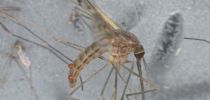
Evaluation of the mosquito fauna (Diptera: Culcidae) in the context of the rewetting of peatlands with regard to the occurrence of zoonoses. More...
Green Container
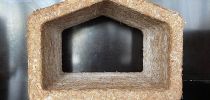
Lightweight construction methods made from Typha plants in cycle-oriented architecture using the example of the "Green Container".
MOOSland
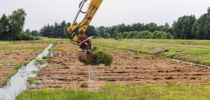
Peat moss paludiculture as a sustainable agricultural use of raised bog soils. More...
Valuation of Peatland Ecosystem Services (VALPEATS)

Valuation of Peatlands as CO₂ Stores - Developing AI-Based Monitoring Tools to Promote Sustainable Land Use. More...
Wet Horizons
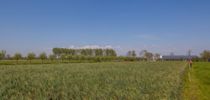
The Wet Horizons European Project will provide the critical impetus to improve wetland restoration by contributing to the expansion of wetland knowledge and developing sound tools and approaches for the rapid implementation of large-scale restoration actions. More....











